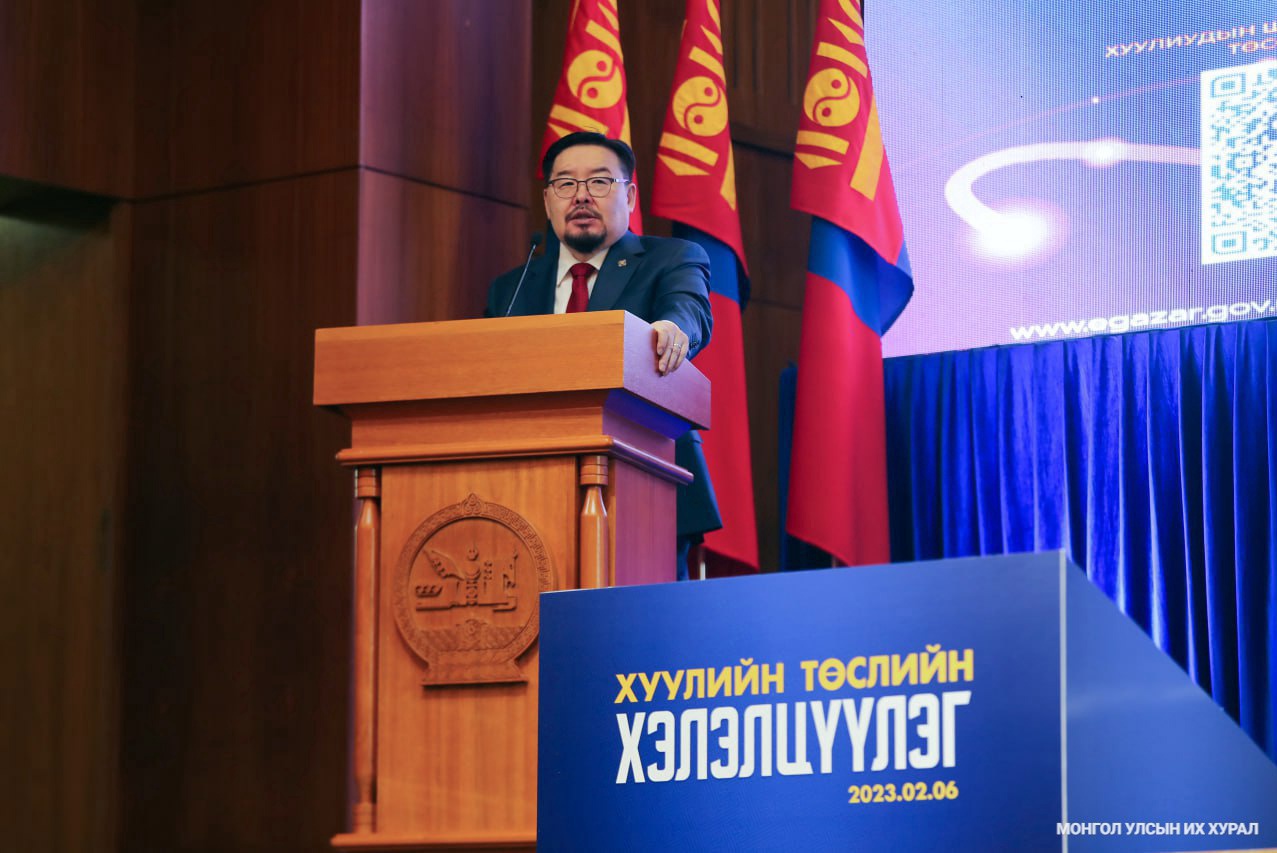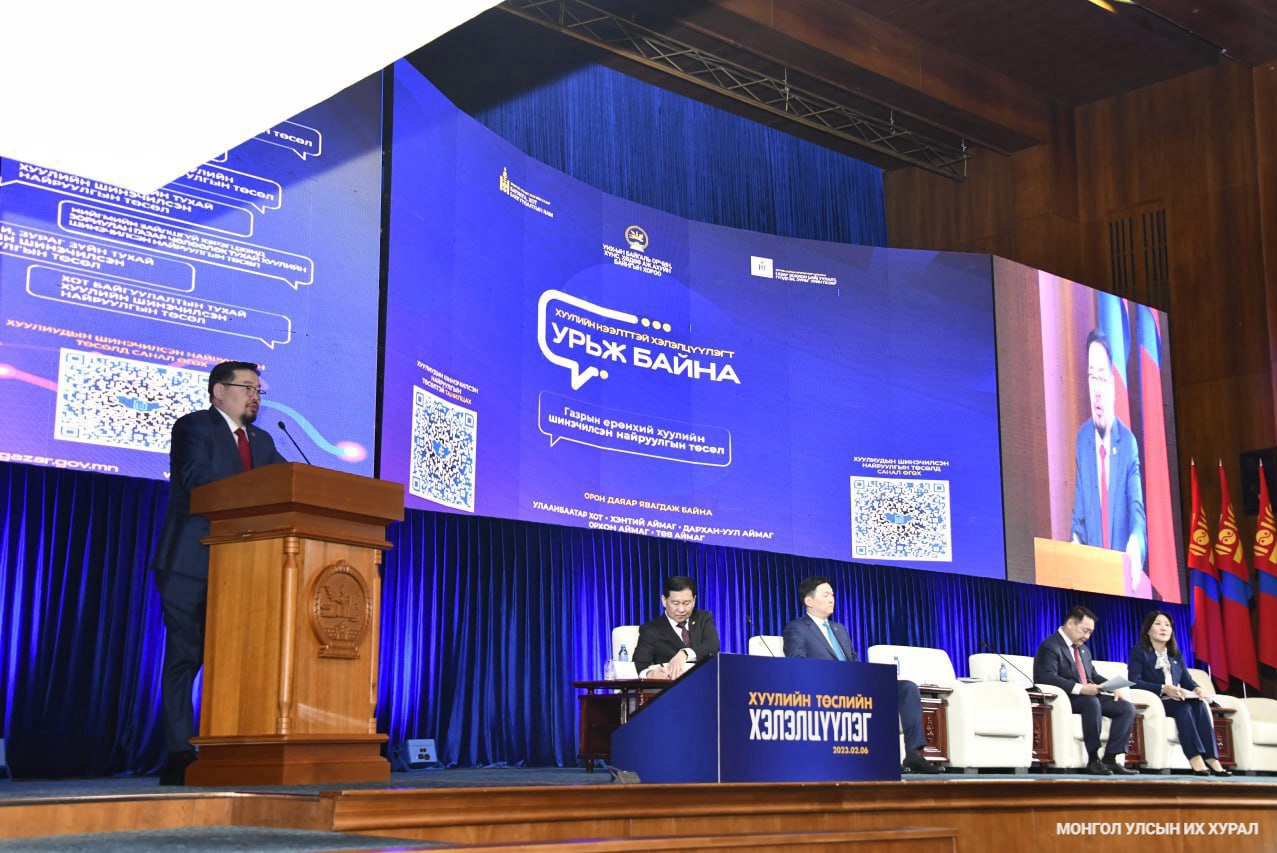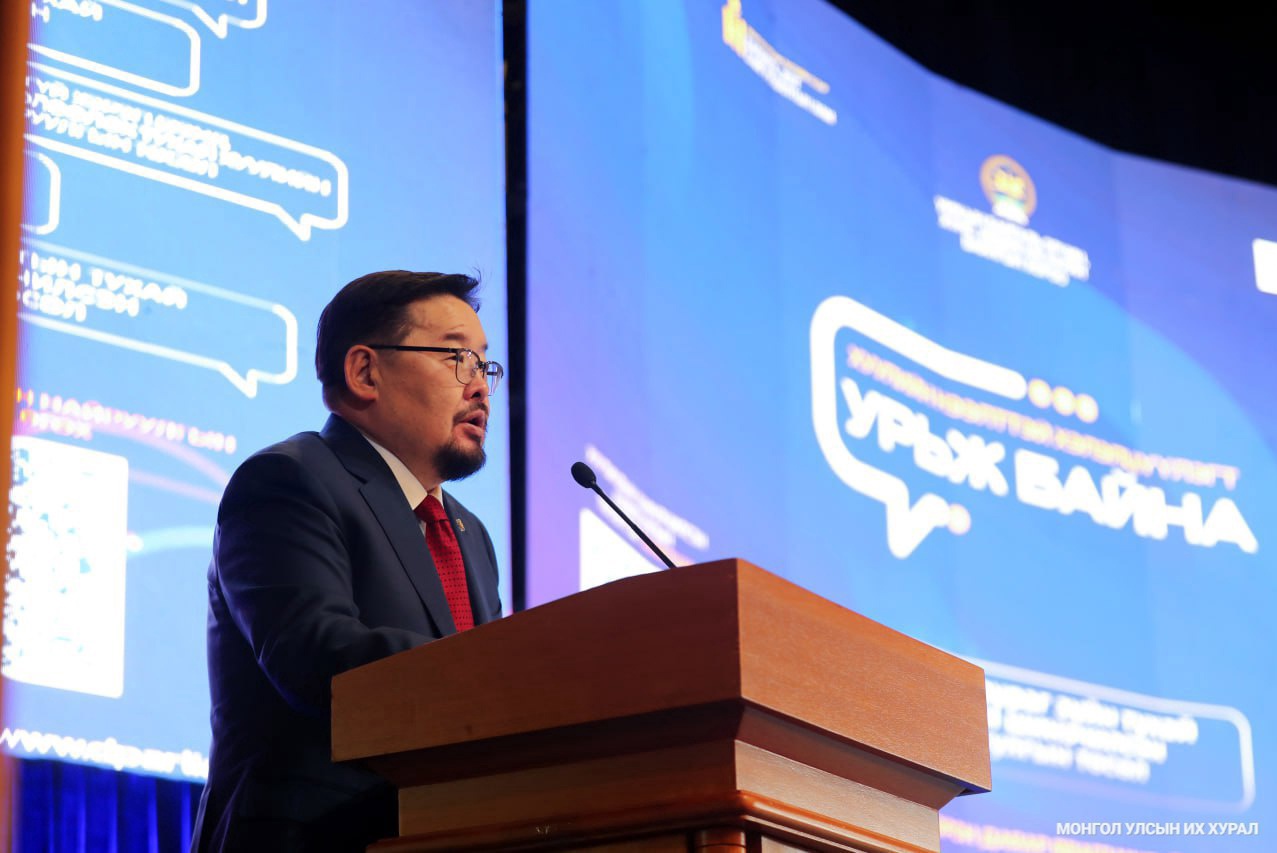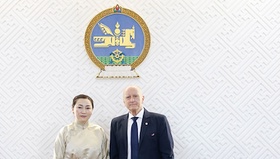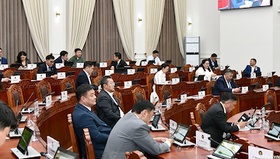Here is the opening remark delivered by Mr. G.Zandanshatar, Chairman of the State Great Hural, for the general discussion for the draft revision package of the “Land Law”, “Geodesy and Cartography” and “Urban Development” at the State Palace today (February 06,2023). More than 400 people from governmental and non-governmental organizations along with academicians, citizens and public representatives are participating in the general discussion.
Distinguished guests, academicians, and representatives of civil society organizations, while I am extending my greetings, I wish success in today's discussions.
Within the framework of the policy document for the implementation of legal reform in 2020-2024 approved by the State Great Hural (Parliament) of Mongolia, it has been envisaged to implement the land reform policy. As part of the land reform policy, the Government of Mongolia has submitted to parliament a package of seven drafts on the Land Laws, the Geodesy and Cartography and Urban Development. The motions of whether these draft laws should be considered have taken place and duly transferred to the relevant Standing Committees to prepare for the first discussion. In order to prepare for the first discussion, the Standing Committees have instructed to carefully organize the discussion of the Land Law with engagements of civil society, local organizations and all other institutions that implement state and local property policies. Because, the land is the foundation of a nation. Without the land, there is no country nor independence. That is why, firstly, it is important to define the land relations in accordance with the national interests. Secondly, the land is the root of economic relations and the basis of property relations. Thirdly, it is the foundation of human and social relations. It is, after the Constitution and the Civil law, an important law that regulates fundamental relations.
Biraagiin Chimid, the draft carrier of the of Mongolia's democratic constitution, once said "The Constitution of Mongolia is Mongolia in the palm of your hand." That is why, by incorporating them into the laws, we have to ensure all the relations that have been stipulated in the Constitution. In this sense, in our Constitution, we confirmed the fundamentals of our country's land, wealth above and below its soil and all other relations connected with the land. For example, Clause 1 of the Article 6 of the Constitution of Mongolia states that "The land, its subsoil, forests, water, fauna, flora, and other natural assets in Mongolia shall be subject to the people's authority and under the protection of the State". Also, Clause 2 of the Article 6 stated that "the lands, except those owned by the citizens of Mongolia, as well as the subsoil, its resources, forests, water resources, and wildlife are public property of the state." In addition, it is stipulated that the subsoil resources or strategic deposits and most of their benefits should be allocated to the people. This is an integral part of the Constitution. The Law on State and local property stipulates that the land and its subsoil wealth are the public property of the state or the property of the entire people, while the state property is the structures and buildings on the land. For example, the State Palace is the state's own property. Therefore, issues such as how to use and privatize the state's own property will be developed at the Government level and submitted to the State Great Hural for approval. However, relations related to the public property of the state must be resolved by the State Great Hural.
All these are provisions on how to exercise the power of the state that derives its source from the people. Article 3.1 of the Constitution essentially states that all government powers originate from the people. Therefore, it can be understood that the state that has bestowed by such authority has been determined into the possibility of using and managing the land, the social wealth, in the interests of the entire country and in order to support the free economic and market relations in accordance with the special procedures prescribed by the land law.
The land is the fundamental wealth of economic relations. An important root of human life. In this sense, the land relations are important relations in determining the direction of development.
72.9 percent of Mongolia's total land is agricultural and farming land. 16.7 percent is land for special needs of the state or acquired for special needs. 0.6 percent is occupied by towns, villages and other settlements. Also, the 96.1 percent of the agricultural land is pasture and the remaining areas are cultivated land, fodder and fallow land. Mining and agriculture, which are the main economic sectors of our country, operate on land and its subsoil resources. For this reason, how are we reforming the land regulation and its legal environment is important to determine the direction of the economic development of our country. Decentralization and congestion reduction policies are also related to this. Due to the lack of proper management of land relations in rural and local areas, concentration has arisen in Ulaanbaatar and causing traffic jams. Recently, I met many herdsmen when I went to work in the countryside. In rural areas, a pasture land tax scheme has been introduced and collecting from pastoralists and nomads on daily basis. It causes difficulty to carry out nomadic animal husbandry. Eventually, how to manage land and agricultural land in relation with the pastoral nomadic animal husbandry will become an important basis of land relations. If there is no possibility for intensifying the nomadic animal husbandry, it will be necessary to properly regulate the land the nomadic herdsmen move and stop. Many young herders want to move to the city or go abroad due to these conceptual problems or hardship of animal husbandry. The herders’ successors are interrupting. They are saying that unless no comprehensive solution for land relations that is coherent to nomadic civilization and nomadic animal husbandry, there are major risks of further escalation of migration from rural areas for vacuity and degradation of pastures and water resources.
Land law is a legislation that applies to every citizen, business segments and industries. For this reason, the package land draft must be carefully discussed and approved based on scientific research and multi-stakeholder participation. There are a lot of suggestions and criticisms coming from provincial and local authorities that the Land law should not be approved in certain way. Each province should carry out further discussions and gather opinions. Therefore, today's discussion is being held in order to discuss and reflect the opinions and participation of citizens, communities, provinces and localities before discussing and approving the package land drafts submitted to the State Great Hural.
We can name many problems related to land relations. It can be said that these problems are mainly caused by the replication, duplication, contradiction and lack of coherence of the land legislations. According to research, the Land law itself is inconsistent. There was also a conclusion that the land relations are regulated separately by different industry regulations. As the mineral and agricultural sectors’ laws regulating land relations differently, every other sectors also regulating separately that causing conflicts with each other and ambiguities. As a result of all this, more than 60 Mongolia laws have regulations on land, land registration, land management plans and regulations for granting land rights have been created that are issued in six ministries. On top of that, there is a lot of overlap and coordination issues at the provinces, sums, capitals and districts. Overlapping of functions at ministries', coordination between ministries and local administrations and violation of the rights of land-owning citizens and enterprises have become very common. The result is disorganized, unplanned land allocation and ineffective planning. It is safe to say that all of this is causing the current congestion and concentration in Ulaanbaatar and is one of the reasons behind the decline in agricultural development. To name just one example, due to the lack of coordination between the Law on Specially protected areas and the Land law, undiscerning land using rights permitted in Specially protected areas of Zaisan, Bogd mountain and disorganized constructions that negatively affecting urban planning have ultimately lead to infrastructure and water supply problems and caused the concentration and congestion.
The absence of planning schools, kindergartens and social infrastructure in every new neighborhood that are being built in the capital and districts is one of the conditions for Ulaanbaatar traffic jams today. The morning rush starts when you deliver your child to school.
For this reason, the revision package land law should, first of all, be aimed at eliminating the deficiencies and contradictions of this legislation and improving coordination. The clearer the legal regulation is, the better its implementation will be. Avoiding unnecessary costs caused by misinterpretations, disputes and conflicts is also economically important.
In this context, land rights should be made consistent with the fundamental regulations of the Civil law, and the rights and obligations should be made clear. It is important to determine the regulation of the use of land for a specific purposes and periods of duration for citizen and legal entities as well as the consequences arising from it.
In the last 10 years, 23 percent of all cases and disputes decided by the administrative courts were land disputes. Therefore, preventing such disputes and violations that waste a lot of time and cost and omitting the contradictions between laws would be effective to improve the economic efficiency of land relations.
Contradictions, ambiguity, indifferences of laws and regulations themselves create and encourage bureaucracy, deferrals, corruption and bribery. Therefore, legislating the detailed process of land allocation, transfer and registration in a very clear manner would be the first step. It is also believed that by creating a legal framework for organizing these activities through electronic systems that are transparent, fast, accessible and under public control, the significant reforms will be created and implemented to reduce bureaucracy and corruption in land relations.
Secondly, the land is a fundamental relation linked with Mongolia's independence and national security. Therefore, it is important to comprehensively include a unified and stable land policy, planning, implementation and control regulations in the package Land draft. In terms of land policy and planning, the problems faced by rural and urban areas are different. As for the urban area, due to the loss of the coordination of the integrated land plan, urban development, infrastructure and inter-sectoral policies, Ulaanbaatar city has become a nest of unfavorable conditions, which are inconvenient for citizens, congested, over-centralized and environmentally degraded and air polluted. Therefore, in order to solve the problem, it is possible to use integrated land planning to ensure inter-sectoral coordination as well as appropriate land evaluation and land payment policies as leverage. The policies on what should be the land tax fee in Ulaanbaatar city, what should it be in rural areas, how to use this solution to decentralize and reduce congestion, etc., should be connected with human beings. There are real estate issues too.
Another problem that is urgent for rural areas is the pasture land use and its degradation. In economics, there is a concept called tragedy of commons. In short, it is a theory that says any public wealth without a designated owner will deteriorate. It is important to seriously discuss and find a solution by linking with the nomadic heritages to the problem, which is a clear example, to properly regulate the use and protection of grasslands in our country.
Since the package land draft was submitted to the State Great Hural, citizens of 21 provinces and 9 districts have presented over 5,000 proposals. Also, the d-Parliament electronic platform of the State Great Hural has received 630 proposals for the package land draft. It should be noted that most of these proposals are related to the incorporated land law draft or the use of pasture land, its regulation and the relationship between taking land under special protection and removing it from special protection.
I believe in all of you as representing governmental and non-governmental organizations, citizens and public, academics and researchers will make a valuable contribution to today's discussion by engaging in constructive, effective solution-seeking brain storming discussions regarding the revision package of land draft law on, Law on geodesy and cartography and revision of law on Urban development that aim to regulate the fundamental social and economic relations of the country.
I wish the today’s discussion a success. Thank you for your attention.
State palace
February 06, 2023

 Eng
Eng  Монгол
Монгол